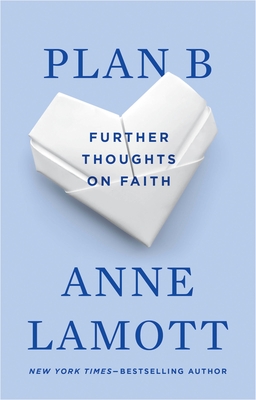You'd think after having studied Hinduism for a month, people might
look at me funny after diving into a book about a woman purely devoted
to her Christian faith. But as far as I can tell, Plan B: Farther Thoughts on Faith
is less about religion and more about humanity, parenting, and a
reminder of how relieving it is that George W. Bush's second term is
over.
In her novel, Anne Lamott talks of her
relationship with her aging body and a teenage son whose body sometimes
gets taken over by a rather unpleasant alien, affectionately known as
"Phil." Her perceptions on parent/child relationships are so dauntingly similar to my own, it's as though she reached into my life, pulled out the worst arguments from my childhood, and stuck them onto a page. But while she expresses her frustrations for having to care for someone who constantly tests her limits and makes her want to scream, she doesn't at all exude hopelessness; if anything, Lamott's words indicate how much stronger parenting has made her and Sam: "Sam has come through so many trials, and has already tested me to the limits of my faith and patience--without even having gotten his driver's license yet. So while his current ride on earth is thrilling and important, what he has lived through and has been loved through is what helps him stay more or less balanced on the whale" (202). She acknowledges that her son is not what causes her outbursts; rather, he's the last straw before the purple-faced monster takes over Lamott's body.
Lamott, through her struggles with unconditional love, uses faith to relate to her own relationships, her own need to love everybody equally. But instead of blindly accepting that Jesus loves everybody, she takes us through her thought process and debates about how Jesus could love an opposing political party just as much as his politicians of choice. Lamott takes her own ideas of love, and brings them to a religious level without sounding too preachy. She takes her reader through a light mental debate before explaining the conclusion--starting at the beginning...that's a thing. Lamott admits that "Jesus ate with sinners--but of course, they ended up killing him. So there's that. Still, I know he would eat with my president, even if he knew that the White House would probably call the police or the Justice Department on him later for his radical positions. He'd do it, because he is available to everyone...I know the world is loved by God, as are all of its people, but it is much easier to believe that God hates or disapproves of or punishes the same people I do, because these thoughts are what is going on inside me much of the time" (221). Lamott's unequivocal...humanness is what makes her so readable, so wise.
As someone who doesn't have one set religion, I never felt like Lamott was trying to convert me to Christianity. Her words advocate believing in others, believing in love. Through her own trial and error, Lamott's readers can reflect on their own...and perhaps be more accepting of the human race by the end.

No comments:
Post a Comment